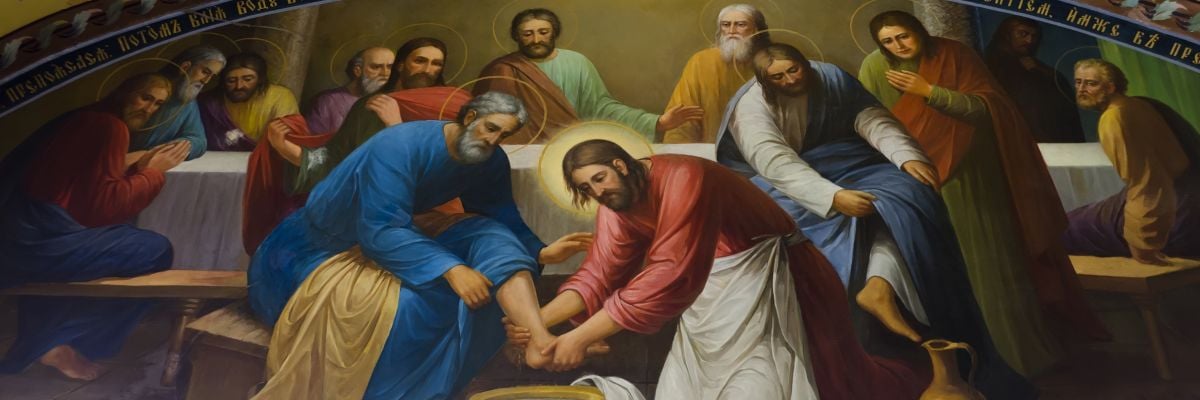
Homily for Holy Thursday, 2020
Before the feast of Passover, Jesus knew that his hour had come
to pass from this world to the Father.
He loved his own in the world and he loved them to the end.
The devil had already induced Judas, son of Simon the Iscariot, to hand him over.
So, during supper,
fully aware that the Father had put everything into his power
and that he had come from God and was returning to God,
he rose from supper and took off his outer garments.
He took a towel and tied it around his waist.
Then he poured water into a basin
and began to wash the disciples’ feet
and dry them with the towel around his waist…
So when he had washed their feet
and put his garments back on and reclined at table again,
he said to them, “Do you realize what I have done for you?
You call me ‘teacher’ and ‘master,’ and rightly so, for indeed I am.
If I, therefore, the master and teacher, have washed your feet,
you ought to wash one another’s feet.
I have given you a model to follow,
so that as I have done for you, you should also do.”John 13:1-15
The Last Supper, depicted here, is undoubtedly the key event of the Savior’s life. The words of John the Beloved Disciple, who learned the thoughts of Jesus’ Sacred Heart by hearing them as he reclined on his breast, these very words reveal all the themes of the divine and human drama that was Our Lord’s life; here, everything comes together.
As the Father’s own eternal Son coming from and returning to him, Our Lord has everything in his power. Yet he chooses to deal with mere creatures: to struggle with them, to serve them, to provide them with the supreme example. Now, Jesus’ example is very different from anyone else’s—not just because his example is the most perfect, but because his example actually enables those who behold it and share in it to imitate it. He has what is called exemplary causality: that is, his example gives the power of being the same as he is.
This is the whole logic of the sacraments, especially of baptism and the holy Eucharist. These sacraments conform our inmost souls to the death and glory of Christ, marking us and enlivening us so as to share the same life as Christ. As St. Paul says “I no longer live, not I, but Christ lives in me.”
This is such a relief for us, with our weaknesses and burden of sin. We do not just try to imitate and obey Christ in his commandments and so then have his approval; no, rather it is Christ himself in us, by his grace who works in us the same things that were worked in himself. This is true both passively and actively: when we imitate Christ by kindness to those in need of mercy, we are simply recognizing his presence in those “least of his brethren.” What we do to them we really, literally do to him, since they are united to him in one body, actually or potentially.
So if Christ our King chooses to use his power over everything just to do the ordinary works of mercy, the daily round of prayer, and the obedient use of the good things of this life, this means that our own Christian life in its ordinary ways and works is nothing less than his all-powerful hand ruling us and all things.
No need then for discouragement—not if we are determined to be generous and normal in our prayer, service of others, and use of God’s pleasurable gifts. This is what guarantees that we will be surrounded by his invisible hosts and covered over with his glory, even if everything seems so plain or ordinary, or even boring or painful or sometimes even terrifying.
The cross includes the crib and the crib the cross; the forty-day fast includes the marriage banquet with the wine flowing freely; the tears of regret include the newfound answer to his question, “Do you love me more than these?” As the cave-dwelling hermit ascetic of Loyola said, “In times of desolation remember consolation and in times of consolation remember desolation.”
This is why Christ is not distracted by the thought of his coming agony: he has an appetite even for dinner and joyful psalms of praise. He is in charge of everything. This is what gives his life, the story of these three days of his passion, burial, and resurrection, such great power and charm.
His is an example like no other. Let us follow him in it, for he has done for us as his Father did for him. Christ has put everything into our power by his all-powerful love. Let us serve one another and so reign with Christ, his mother, and all his holy ones. By serving, they returned to God on high!



